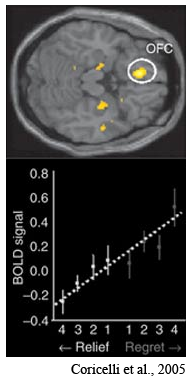Representation of envy?
 Aldo Rustichini , Professor of Economics at the University of Minnesota, gave an interesting talk at the Sage Center yesterday titled, simply, “Envy”. He argued that envy is the social equivalent of regret and that each plays a pivotal role in decision making. He defined regret as discovering that an alternate outcome would have led to a greater benefit and defined relief as discovering an alternate outcome would have led to a greater loss. He showed data from Coricelli et al. (2005) demonstrating that areas of orbital prefrontal cortex are more active during periods of high regret compared to periods of high relief. This relationship was shown to be parametric, with activity linearly increasing as overall levels of relief decreased and regret increased [see right]. Rustichini then extended their finding by showing data that this orbital activity encodes for envy when it takes place in a social context.
Aldo Rustichini , Professor of Economics at the University of Minnesota, gave an interesting talk at the Sage Center yesterday titled, simply, “Envy”. He argued that envy is the social equivalent of regret and that each plays a pivotal role in decision making. He defined regret as discovering that an alternate outcome would have led to a greater benefit and defined relief as discovering an alternate outcome would have led to a greater loss. He showed data from Coricelli et al. (2005) demonstrating that areas of orbital prefrontal cortex are more active during periods of high regret compared to periods of high relief. This relationship was shown to be parametric, with activity linearly increasing as overall levels of relief decreased and regret increased [see right]. Rustichini then extended their finding by showing data that this orbital activity encodes for envy when it takes place in a social context.
In brief, the conditions of his study were skilled-won, skilled-lost, unskilled-won, and unskilled-lost. These indicated whether the task involved strategy and whether you did better on each trial than another human completing the tasks outside the magnet. The region in orbital cortex didn’t change its activity level at all to the unskilled conditions. However, during the skilled conditions there was an increase in signal to the skilled-won condition and a relative decrease in signal in the skilled-lost condition. He argued that this represented social envy, because its activity only changed in conditions where a competitor’s skill impacted the outcome.
The confounding factor in this argument is that it involved a test of skill. You are no longer testing just the social comparison between yourself and a competitor, but also feedback signals from orbital cortex related to skill learning. In the skilled-lost condition you need to alter your behavior to a more optimal solution whereas in the skilled-won condition you need to reinforce the strategy and skills used. Some good papers related to this processing are Furuyashiki and Gallagher (2007) and Baxter et al. (2000).
I remain unconvinced regarding the argument for envy in orbitofrontal cortex. The skilled/unskilled comparison is not the best way to approach the problem. It also highlights a question I feel we should address as we examine our results: is there a more domain-general information processing ability that might explain the data? For this study I feel that the larger umbrella of skill learning could just as easily explain the results.
Refs
– Baxter MG, Parker A, Lindner CC, Izquierdo AD, Murray EA. (2000). Control of response selection by reinforcer value requires interaction of amygdala and orbital prefrontal cortex. Journal of Neuroscience, 20(11):4311-9.
– Coricelli G, Critchley HD, Joffily M, O’Doherty JP, Sirigu A, Dolan RJ. (2005). Regret and its avoidance: a neuroimaging study of choice behavior. Nature Neuroscience, 8(9):1255-62.
– Furuyashiki T, Gallagher M. (2007). Neural encoding in the orbitofrontal cortex related to goal-directed behavior. Annals of the New York Academy of Sciences, 1121:193-215.

Leave a Reply
You must be logged in to post a comment.